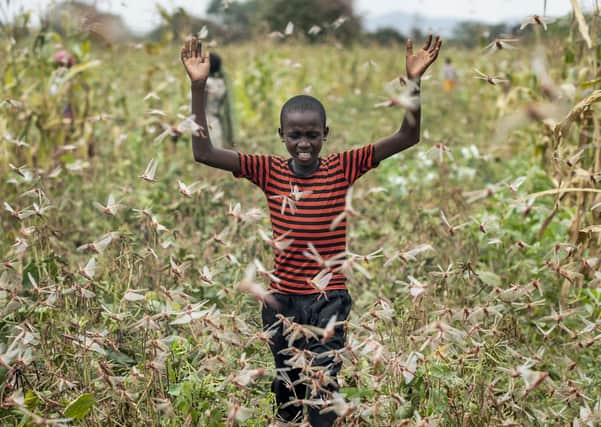Here’s the big climate change news you may have missed amid the pandemic – Dr Richard Dixon


Almost every bit of news recently has been about the coronavirus and its impact. This is not surprising. Some people have an avid fascination for every little contradictory detail but others have started avoiding the news and social media until it all gets a little less glum.
Surprisingly, there is other news, you may just not have seen it. From record melting of the ice sheets to swarms of billions of locusts we continue to learn more about the state of our planet, despite the virus.
Advertisement
Hide AdAdvertisement
Hide AdRight now, compared to the long-term average, an area of the Arctic the size of France is bare ocean instead of being covered with sea ice.
A new study found Greenland’s massive ice-sheet experienced the largest ever loss of ice last year, prompting fears that current models underestimate the amount of sea-level rise climate change will bring this century. If it were all to melt, this one ice-sheet would raise global sea levels by six or seven metres.
Last week saw the highest ever weekly average level of carbon dioxide in the atmosphere in modern times, in a series measured at the top of a Hawaiian volcano since the 1950s. Levels of the main climate change gas are now over 50 per cent higher than pre-industrial levels.
With much of the global economy shut down, there is a big short-term dip in climate emissions right now but the long-term trend is still far from the rapid reduction in business-as-usual emissions that we need.
Global temperatures were over a degree warmer than the long-term average in March and temperatures across all of Siberia were more than four degrees warmer.
Driven by unusual storms and a mild winter, locust swarms as big as cities continue to devastate crops in Eastern Africa, with heavy rains in March expected to cause a dramatic increase in locust numbers there and in Yemen and Iran, threatening food supplies for millions of people. The UN’s Food and Agriculture Organisation describe the situation as “extremely alarming”.
Efforts to tackle the locusts are now bogged down by the impacts of coronavirus.
A week-old forest fire in Ukraine has come within a kilometre of the remains of the Chernobyl nuclear power station, burning up contaminated materials in the 30km exclusion zone. Firefighters have been trying to halt the blaze from helicopters, in nightmarish scenes eerily reminiscent of the reactor explosion almost exactly 34 years ago.
Advertisement
Hide AdAdvertisement
Hide AdHave you also missed some good news? Yes, for instance, three quarters of all new electricity capacity built last year was one form or another of renewable energy, Germany just exceed 50 per cent of its electricity coming from renewables and the city of Adelaide is going 100 per cent renewable. Amsterdam plans to use environmental and social principles to plan its recovery from the pandemic.
An international group of marine scientists spelled out this month how we could use the lessons from successful small-scale projects to drive a nature recovery of all our oceans by 2050.
The US shale gas industry is on the rocks because of low gas prices and collapsed demand. And the coronavirus connection has led to a new draft law in China banning the eating of wild animals.
Of course it is right that we pay plenty of attention to this crisis, and the human stories that go with it, but we must not forget the big, long-term experiment we are carrying out on the Earth’s environment is still mostly going really badly.
Dr Richard Dixon is director of Friends of the Earth Scotland
A message from the Editor:
Thank you for reading this article on our website. While I have your attention, I also have an important request to make of you.
With the coronavirus lockdown having a major impact on many of our advertisers - and consequently the revenue we receive - we are more reliant than ever on you taking out a digital subscription.
Subscribe to scotsman.com and enjoy unlimited access to Scottish news and information online and on our app. With a digital subscription, you can read more than 5 articles, see fewer ads, enjoy faster load times, and get access to exclusive newsletters and content. Visit www.scotsman.com/subscriptions now to sign up.
Advertisement
Hide AdAdvertisement
Hide AdOur journalism costs money and we rely on advertising, print and digital revenues to help to support them. By supporting us, we are able to support you in providing trusted, fact-checked content for this website.
Frank O’Donnell
Editorial Director
Comments
Want to join the conversation? Please or to comment on this article.
